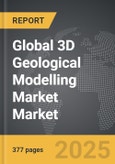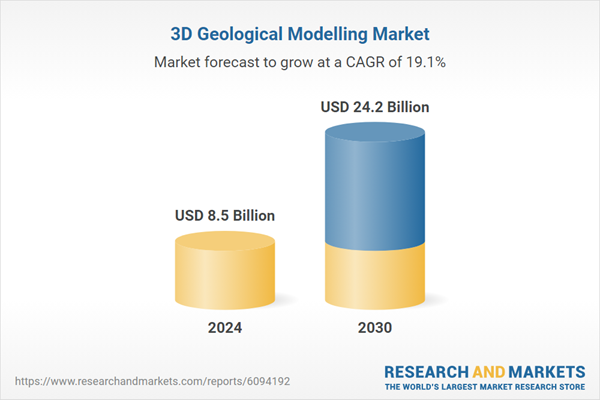Global 3D Geological Modelling Market - Key Trends & Drivers Summarized
Why Is 3D Geological Modelling Emerging as a Foundational Tool in Subsurface Analysis, Resource Exploration, and Geotechnical Risk Mitigation?
3D geological modelling is becoming a strategic enabler for industries dependent on subsurface characterization, including mining, oil and gas, civil engineering, and groundwater management. These digital models integrate geological, geophysical, geotechnical, and geochemical data to produce volumetric representations of underground structures, faults, lithology, and mineral distributions. This comprehensive visualization facilitates deeper understanding of complex subsurface conditions, significantly improving decision-making around exploration, excavation, and structural design.The growing demand for high-resolution spatial data to optimize exploration drilling, reduce project uncertainty, and comply with regulatory requirements is accelerating the adoption of 3D geological models. These tools enable scenario testing, resource estimation, and geohazard analysis with far greater precision than traditional 2D techniques. As environmental scrutiny intensifies and extraction projects grow in scale and complexity, 3D geological modelling offers a risk-reducing, cost-effective, and technically robust approach to early-stage site assessments and operational planning.
How Are Software Integration, AI-Driven Automation, and Cloud Platforms Redefining the 3D Geological Modelling Landscape?
Advancements in geoscience software ecosystems are transforming the accessibility and functionality of 3D geological modelling. Integration with GIS, BIM, mine planning, and reservoir simulation platforms allows seamless data flow across disciplines and project stages. This interoperability supports real-time updates, iterative refinement of models, and collaborative workflows between geologists, engineers, and decision-makers.Artificial intelligence and machine learning are driving automation in model generation, pattern recognition, and classification of geological features. These capabilities accelerate interpretation cycles and reduce manual bias, particularly when dealing with large datasets from seismic surveys, core samples, and remote sensing. Cloud-based modelling platforms are enabling scalable processing power, secure data management, and remote access - essential for global teams working across decentralized projects.
Sophisticated visualization techniques, including immersive 3D environments and VR/AR integration, are also enhancing stakeholder communication and training applications. Together, these innovations are moving 3D geological modelling from a specialized geoscience function to a core strategic asset embedded across natural resource, infrastructure, and environmental domains.
Which Sectors, Regions, and Deployment Scenarios Are Driving Momentum in the 3D Geological Modelling Market?
Key demand verticals include mineral exploration, oil and gas reservoir analysis, hydrogeology, tunneling, and large-scale infrastructure projects such as dams, highways, and rail systems. Urban development and climate resilience initiatives are also deploying 3D geological models to assess subsidence risk, groundwater recharge zones, and soil-structure interactions. The expanding scope of environmental impact assessments and regulatory due diligence further reinforces market penetration.Developed regions like North America, Australia, and Northern Europe are leading in adoption, supported by digital infrastructure, technical expertise, and stringent regulatory environments. In contrast, emerging economies in Latin America, Africa, and Southeast Asia are showing rising interest driven by resource exploration and infrastructure modernization agendas. National geological surveys and public-private partnerships are catalyzing investment in regional data repositories and modelling capabilities.
Field-to-office digitalization strategies, increasing use of UAVs and LiDAR for topographic data collection, and integration with drilling and sensor technologies are expanding deployment scenarios. The transition from static, single-purpose models to dynamic, multi-user platforms is fostering a new generation of operationally embedded, decision-oriented geological modelling practices.
What Is Accelerating the Strategic Importance of 3D Geological Modelling in Future-Facing Resource and Infrastructure Planning?
The strategic value of 3D geological modelling is rising as industries seek to optimize resource yield, reduce environmental footprint, and ensure safety in increasingly complex geotechnical contexts. These models are evolving into live, continuously updated digital twins of the subsurface, providing a critical foundation for predictive analytics, risk mitigation, and sustainability planning.Driving factors include escalating demand for resource certainty in high-cost projects, regulatory push for digital documentation of subsurface data, and the convergence of geoscience with digital engineering and environmental stewardship. Continued advancements in data integration, sensor fusion, and model fidelity are reinforcing 3D geological modelling as a cornerstone technology in the digital transformation of geoscience-driven industries.
As subsurface data becomes as vital as surface infrastructure, could 3D geological modelling become the invisible architecture shaping how we extract, build, and safeguard in a resource-constrained world?
Report Scope
The report analyzes the 3D Geological Modelling market, presented in terms of market value (US$). The analysis covers the key segments and geographic regions outlined below:- Segments: Offering (Software Offering, Services Offering); Technology (LiDAR Technology, Photogrammetry Technology, Structured Light Scanning Technology, SLA Technology, Other Technologies); Deployment (Cloud-based Deployment, On-Premise Deployment).
- Geographic Regions/Countries: World; United States; Canada; Japan; China; Europe (France; Germany; Italy; United Kingdom; Spain; Russia; and Rest of Europe); Asia-Pacific (Australia; India; South Korea; and Rest of Asia-Pacific); Latin America (Argentina; Brazil; Mexico; and Rest of Latin America); Middle East (Iran; Israel; Saudi Arabia; United Arab Emirates; and Rest of Middle East); and Africa.
Key Insights:
- Market Growth: Understand the significant growth trajectory of the Software Component segment, which is expected to reach US$17.9 Billion by 2030 with a CAGR of a 20.7%. The Services Component segment is also set to grow at 15.3% CAGR over the analysis period.
- Regional Analysis: Gain insights into the U.S. market, valued at $2.3 Billion in 2024, and China, forecasted to grow at an impressive 25.3% CAGR to reach $5.5 Billion by 2030. Discover growth trends in other key regions, including Japan, Canada, Germany, and the Asia-Pacific.
Why You Should Buy This Report:
- Detailed Market Analysis: Access a thorough analysis of the Global 3D Geological Modelling Market, covering all major geographic regions and market segments.
- Competitive Insights: Get an overview of the competitive landscape, including the market presence of major players across different geographies.
- Future Trends and Drivers: Understand the key trends and drivers shaping the future of the Global 3D Geological Modelling Market.
- Actionable Insights: Benefit from actionable insights that can help you identify new revenue opportunities and make strategic business decisions.
Key Questions Answered:
- How is the Global 3D Geological Modelling Market expected to evolve by 2030?
- What are the main drivers and restraints affecting the market?
- Which market segments will grow the most over the forecast period?
- How will market shares for different regions and segments change by 2030?
- Who are the leading players in the market, and what are their prospects?
Report Features:
- Comprehensive Market Data: Independent analysis of annual sales and market forecasts in US$ Million from 2024 to 2030.
- In-Depth Regional Analysis: Detailed insights into key markets, including the U.S., China, Japan, Canada, Europe, Asia-Pacific, Latin America, Middle East, and Africa.
- Company Profiles: Coverage of players such as Ampac Seed Company, Barenbrug Group, Bethel Farms, Bladerunner Farms, BrettYoung and more.
- Complimentary Updates: Receive free report updates for one year to keep you informed of the latest market developments.
Some of the 44 companies featured in this 3D Geological Modelling market report include:
- Agisoft LLC
- Aspen Technology Inc.
- BRGM
- British Geological Survey (BGS)
- C Tech Development Corporation
- California Geological Survey (CGS)
- Dassault Systèmes (GEOVIA)
- Frontiers Media SA
- GemPy
- Geological Survey of Victoria
- GEOREKA
- GeoStru
- GoldSim Technology Group LLC
- Hatarilabs
- I-GIS A/S
- John T. Boyd Company
- K-MINE
- LandacBio
- Maptek Pty Ltd
- Metashape (Agisoft LLC)
This edition integrates the latest global trade and economic shifts into comprehensive market analysis. Key updates include:
- Tariff and Trade Impact: Insights into global tariff negotiations across 180+ countries, with analysis of supply chain turbulence, sourcing disruptions, and geographic realignment. Special focus on 2025 as a pivotal year for trade tensions, including updated perspectives on the Trump-era tariffs.
- Adjusted Forecasts and Analytics: Revised global and regional market forecasts through 2030, incorporating tariff effects, economic uncertainty, and structural changes in globalization. Includes historical analysis from 2015 to 2023.
- Strategic Market Dynamics: Evaluation of revised market prospects, regional outlooks, and key economic indicators such as population and urbanization trends.
- Innovation & Technology Trends: Latest developments in product and process innovation, emerging technologies, and key industry drivers shaping the competitive landscape.
- Competitive Intelligence: Updated global market share estimates for 2025, competitive positioning of major players (Strong/Active/Niche/Trivial), and refined focus on leading global brands and core players.
- Expert Insight & Commentary: Strategic analysis from economists, trade experts, and domain specialists to contextualize market shifts and identify emerging opportunities.
Table of Contents
Companies Mentioned (Partial List)
A selection of companies mentioned in this report includes, but is not limited to:
- Agisoft LLC
- Aspen Technology Inc.
- BRGM
- British Geological Survey (BGS)
- C Tech Development Corporation
- California Geological Survey (CGS)
- Dassault Systèmes (GEOVIA)
- Frontiers Media SA
- GemPy
- Geological Survey of Victoria
- GEOREKA
- GeoStru
- GoldSim Technology Group LLC
- Hatarilabs
- I-GIS A/S
- John T. Boyd Company
- K-MINE
- LandacBio
- Maptek Pty Ltd
- Metashape (Agisoft LLC)
Table Information
| Report Attribute | Details |
|---|---|
| No. of Pages | 377 |
| Published | January 2026 |
| Forecast Period | 2024 - 2030 |
| Estimated Market Value ( USD | $ 8.5 Billion |
| Forecasted Market Value ( USD | $ 24.2 Billion |
| Compound Annual Growth Rate | 19.1% |
| Regions Covered | Global |









